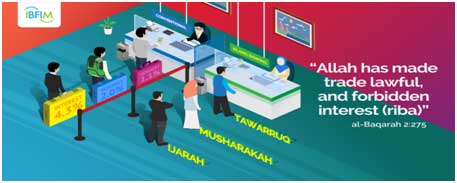
Month of Ramadan and Islamic Banking

For many of us, the holy month of Ramadan has come to mean only taraweeh, Sehri and iftar. In the rush to prepare for social occasions with family and friends, we often forget that Ramadan is basically a time for reflection – that time of the year when we recharge our faith, reiterate the values of kindness and self-discipline, even as we prepare for the challenges of the year ahead.
This is the time to remind ourselves the necessity of leading an exemplary life and reaffirming the quality of taqwa or consciousness of God.
In the modern age, however, many of us face personal conflict between our lifestyle choices, financial practices and Islamic principles. The holy month, therefore, is the most appropriate time for us to reflect on whether our financial decisions, saving and spending habits and social duties are in consonance with Islamic ethics.
An increase in social interaction during this period, results in many people going overboard with spending. We forget that Ramadan is about abstinence from food and drink during the day and avoidance of wastage. It is about breaking down social barriers between rich and poor and a period in which the rich suffer hunger pangs to understand the plight of the less-fortunate.
In this respect Holy Quran says:
“And upon those who are able (to fast, but only with hardship), a ransom (as substitute) of feeding a poor person (each day). And whoever volunteers extra – it is better for him. But to fast is best for you, if you only knew.” (Quran 2:184)
Therefore, for us to waste money on excess food and revelry is certainly not be in keeping with the spirit of Ramadan
After the global financial meltdown, Islamic finance has been looked upon as a more dependable format for conducting transactions. The Islamic banks now offer a lot of investment options including sukuk, Islamic funds, Islamic deposits and saving schemes. Today, both Muslim and non-Muslim investors can opt for Islamic financing that is less stressful and more benign, since Islam does not believe in the concept of interest.
Apart from investing for material well-being, a good Muslim also ‘invests’ in ‘eternal’ gains, by of allocating a percentage of his income to donations or financial aid. We must remember the poor and the importance of zakat and that allocating a percentage of income to donations is of particular significance during Ramadan.
However, rather than contributing to an individual, or just donating for the sake of it, we can also pool resources and contribute to reputable institutions, which will disburse the funds appropriately.
For Islamic finance, it is a merger of faith and Ramadan offers the most brand-building opportunities through public relations exercises such as sponsoring public needs along with launching of new products and extending donations to needy people and orphans.
However Islamic banks must keep in mind that this month is the most opportune time to recruit more customers keeping in mind that the right hand should not know when, where and how much the left hand is giving?
During the fasting month, many Islamic banks can ‘pause’ customer payment on financing of big items like housing finance. The rationale of this gesture is to reduce the customer’s burden.
The social responsibility of Islamic finance needs to be shown and felt in the community. A sacrifice worth is if the Islamic bank take the Ramadan suspended payments and establish a Qard-ul-Hassan fund and give out money to local Muslims and non-Muslims having financial difficulties, and the remainder sent to NGOs in the least developed Muslim countries.
Finally, we should also understand that the ethical choices we make during the month of Ramadan must be carried over throughout the year.
Every aspect of our lives needs to be scrutinized to ensure we are following the principles of ethical living. And once we do this kind of minute self-introspection of our choices in life, it will translate to a better life all around – and that includes financial stability and comfort.
Let us use this blessed month to step back, evaluate our financial decisions and choices and live a life based on Islamic principles and moderation, not just during Ramadan, but our entire lives. Islamic Banks should come up with new products to serve the whole humanity not only in Ramadan but in the whole year. Thus in this way they can change the month of Ramadan for the blessings of every one.


actos parasitarios
valhalla semaglutide
acarbose distribution
does abilify make you sleepy
remeron sleep
can you take tramadol with robaxin
прогнозы бесплатно на хоккей
protonix cost
repaglinide azione
synthroid timing
zithromax and spironolactone
liraglutide and sitagliptin
mylan synthroid
tamsulosin webmd
how to wean off venlafaxine 150 mg
side effects tizanidine
voltaren gel coupon walgreens
how long does it take for zyprexa to work
is it dangerous to drink while taking wellbutrin
zofran bei chemo
zyprexa dosing
generic for zetia
tips for taking zofran
how much is cialis with insurance
levitra 40 mg reviews
brand cialis with prescription
buy levitra without a prescription
cialis over the counter 2018
buy levitra without prescription
кодирование от алкоголизма в уфе
cialis memes
levitra tablets buy
how many 20 mg sildenafil should i take
cialis generic online pharmacy
sildenafil blood pressure
indian pharmacy clonazepam
online sildenafil prescription
rite aid pharmacy viagra price
I don’t think the title of your article matches the content lol. Just kidding, mainly because I had some doubts after reading the article.